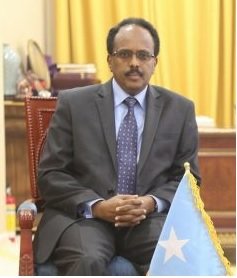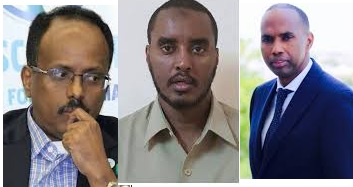WardheerNews Editorial
In the aftermath of Somalia’s civil war, the center, and all its institutional powers bulked and were thrown into the dustbin. It was then that a bottom-up approach to reconstitute Somalia using the application of federalism was conceived. Thus, the advocacy of sharing powers between member states and institutions was born out of necessity.

President Farmajo does not hold federalism with high regard, and he is now in full gear to destroy it block by block. In so many unambiguous words he shared with his fellow Somali citizens, with his belief that federalism does not bode well for a stronger Somalia. However, he has weakened Somalia by playing a junior partner to Ethiopia, therefore, legitimizing the erosion of Somali sovereignty.
In public, he touts a strong Somalia; in practice, however, Villa Somalia looks like an extension of Menelik’s palace. A case in point is that the Ethiopian Prime Minister, Abiy Ahmed, dared to articulate a vision of uniting Somalia with his country while standing on the corridors of Villa Somalia. Farmajo appeared to be a slumber, dazed and appearing unfazed by the astounding announcement.
Farmajo’s alibi that “we need strong central government” is a ploy to promote his nascent, autocratic regime that is growing fast in Mogadishu. That federalism is dying in the hands of Mohamed Abdullahi Farmajo is no longer the imagination of his critics, but a gathering storm.
With the fall of President Haaf into the fold of Villa Somalia, a goal that Farmaajo sought since he came to office has materialized: three of the most fragile states are for all practical purposes now in the fold of Villa Somalia.
Ahmed Islam (Madobe), the President of Jubaland State, is the last standing regional president in the entire South Somalia. The rest have fallen victim to Villa Somalia, thanks to the millions of dollars paid to members of parliamentarians and those presidents who accepted Villa Somalia’s patronage have decided to vacate their seats.
So far, Puntland and Somaliland are not within the control of Villa Somalia. In the case of Puntland, Farmajo failed in the last election in January 2019 after his candidate was badly defeated despite wasting millions of dollars to influence the election.
The case of Somaliland is entirely a different story. It has declared its independence from the rest of Somalia, and it is no longer seen both internally and externally as a mere regional government that Farmajo can easily swallow. Mogadishu is in no position to force it in the foreseeable future to treat Somaliland the way it does its regional governments in the south.
The good name and reputation of Federalism has been maligned for a long time not only by Farmajo team but also by those who oppose him philosophically, ideologically, and personally. Both parties are committed to getting rid of his convoluted and stagnated political principle that has failed to bear fruits. They only differ in their desire to replace him and take over Villa Somalia. Other than that they don’t seem to have a plan that vastly differs from the current regime. They both erroneously argued for a long time that federalism was introduced by Somalia’s enemies (Ethiopia and Kenya), despite both sides bowing down to these neighboring powers.
Alas, the idea of a federal Somalia was born as a mitigating solution to the aftermath of the clan-driven civil war. It was neither born in Mbagathi nor was it an idea which Meles Zenawi’s Ethiopia gave to Somalia’s now extinct warlords.
To the contrary, it came out of a paradigm shift to recreate a united democratic Somalia that could be an ideological counterpart to Siyad Barre’s highly centralized autocratic rule (1969-1990).
In a well-crafted and a long essay that the late Mustafa Haji Nur read over Radio Kulmis in 1980, he impressively dived deeper into a comparative analysis of Barre’s unitary state and a futuristic federal Somalia as a viable alternative. Extensively drawing on the European experience, Mustafa made a persuasive argument on why Somalis should reconstruct their state as a federal one.
In the presentation, Mustafa, a well-read first-class journalist, and a patriot, drew guiding lines for Somalia to watch out for clan politics. In particular, he spoke to his northern Somalis and warned them not to follow the secessionist road but rather help Somalia come together to create a new democratic federal Somalia.
Another persuasive debate on behalf of the federalist model of
governance was made by Faisal Roble in a well-received forum in 2019. Faisal
raised his presentation in a loud and clear voice at the Puntland Development
and Research Center (PDRC) in Garowe, Puntland, Somalia.
Mr. Roble successfully likened the core-periphery debate to Somalia’s debate on
federalism, resurrected the idea that the link between
decentralization and democratization suitable for good governance, and,
most importantly, the need for federalism to engender development at the local
level.
Victory for Madobe is a loss for Autocratic Rule
Former President Hassan Sheikh Mohamed initially was less convinced about the viability of this system for Somalia. He initially fought against the formation of Jubbaland. However, in his second year in office, he realized that federalism was not an antithesis to a United Somalia and as such moved forward to complete the process of the federation before he completed his term.

With Farmajo’s reign in Villa Somalia, came back the prospect for a centralist vision again in Somalia. This vision is anathema both to Somaliland and Puntland. For Somalia, Farmajo sends the message that with or without the will of their people, he alone will dictate the terms of a forced reunion.
For Puntland, Farmajo sends the message that the 1998 established regional autonomy and all the work it did for the creation and preservation of federalism is a passé.
To Jubbaland the message is even sterner; Farmajo will reimagine it and make sure that one of his current ministers such as Minister Omar, or cronies financed by Villa Somalia, will replace Ahmed Madobe.
However, in his quest to re-conquer all of Somalia, Farmajo has lost tough battles and only won the softer ones. Yes, he won to replace the tree southern states. Perhaps he did so because the those states did not stand on strong grounds, perhaps their federalism was not rooted in the political fabric of the three regions.

Even so, his loss to implant his pawn in Puntland during the 2019 presidential election proves to us that his powers are limited.
Despite all that, given the history of Puntland and Jubbaland and the sacrifices they paid for establishing their regional federal states, Farmajo’s illegal tactics of buying candidates with money (millions of dollars) to defeat federalism will not work in Jubbaland.
Yes, President Ahmed Islam is the last man standing, and he can be criticized from many angles. Yet his fight with Farmajo is a fight between a potential autocratic president who is relentlessly seeking to fill the description of a naïve, stubborn man trying to center all his power in Villa Somalia and an imperfect patriot. Ahmed Islam’s victory is another step to slowdown the progression of Farmajo’s autocratic rule that is in the making.
Mr. Madobe is different from Haaf in many ways. First and foremost, he came to power after a long struggle with various militias vying for power in Jubaland including Al-Shabaab. Secondly, he has the support of Jubbalanders and Puntland state who both desire elections that are fair and free from Farmajo’s stretchy hand. Thirdly, the clan composition in Jubbaland is more sensitive and could easily turn out to be volatile.
Taking into account Ahmed Madobe’s charismatic qualities, his long history of fighting to liberate Jubbaland as well his eloquence in patriotic rhetoric and the ability to connect with the people of Somalia makes toppling him a rough job for the Framajo regime. As a matter of fact, his win in the upcoming election is an embarrassing defeat for the team in Villa Somalia, who has used their focus, meager public resources and autocratic tendencies to dismantle federal member states and center all the power of federal state member in Villa Somalia.
WardheerNews
Email:[email protected]
Read more: WardheerNews editorial archives
We welcome the submission of all articles for possible publication on WardheerNews.com. WardheerNews will only consider articles sent exclusively. Please email your article today . Opinions expressed in this article are those of the author and do not necessarily reflect the views of WardheerNews.
WardheerNew’s tolerance platform is engaging with diversity of opinion, political ideology and self-expression. Tolerance is a necessary ingredient for creativity and civility.Tolerance fuels tenacity and audacity.
WardheerNews waxay tixgelin gaara siinaysaa maqaaladaha sida gaarka ah loogu soo diro ee aan lagu daabicin goobo kale. Maqaalkani wuxuu ka turjumayaa aragtida Qoraaga loomana fasiran karo tan WardheerNews.
Copyright © 2024 WardheerNews, All rights reserved


